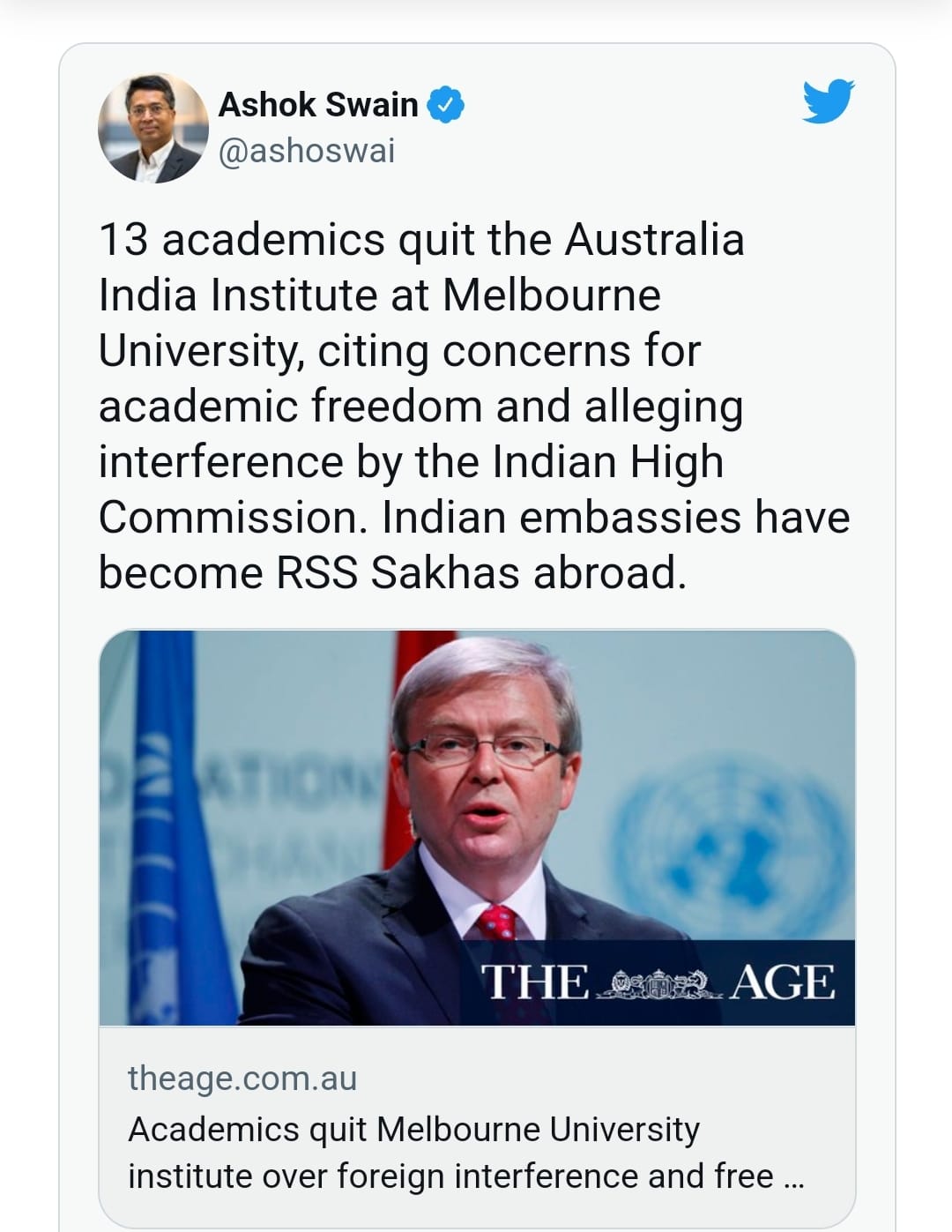DESIBUZZCanada
Events Listings
Dummy Post

International Day Of Yoga To Be Virtually Celebrated Saturday At 4pm

CANCELLED: Coronavirus Fears Kills Surrey’s Vaisakhi Day Parade

ADVERTISE WITH US: DESIBUZZCanada Is The Most Read South Asian Publication Online

SURREY LIBRARIES: Get Technology Help At Surrey Libraries

WALLY OPPAL: Surrey Police Transition Update On Feb. 26

GONE ARE THE DAYS - Feature Documentary Trailer

Technology Help At Surrey Libraries

Birding Walks

Plea Poetry/short Story : Youth Contest

International Folk Dancing Drop-in Sessions
16 Academics Resign From Australian University’s India Institute Over Interference
- May 26, 2022

In Australia, debate continues about claims Indian High Commission interfered in academic institute with 16 fellows resigning from the University of Melbourne’s Australia India Institute, citing concerns about academic freedom.
By Gargee Chakravarty
In Australia, debate continues about claims Indian High Commission interfered in academic institute
Prime Minister Narendra Modi and the Prime Minister of Australia Malcolm Turnbull at the Akshardham Temple, in New Delhi on April 10, 2017. | Narendra Modi/Facebook
In 1997. a UNESCO recommendation concerning the Status of Higher Education Personnel said that “academic freedom lies at the very heart of higher education and provides the strongest guarantee of the accuracy and objectivity of scholarship and research”. It is defined as the freedom of teachers, students, and academic institutions to pursue knowledge wherever it may lead, without undue or unreasonable interference.
The resignation of 13 fellows affiliated with Melbourne-based Australia India Institute with regards to impingement of this very academic freedom has become a major point of debate in Australia and India over the last few weeks. The fellows had resigned on March 29, citing concerns about academic freedom, alleging interference by the Indian High Commission in Australia.
It has been learnt that three more fellows affiliated with Australia India Institute have resigned since the story first came to light on March 31, taking the total resignations to 16.
The resignation letter signed by the 13 fellows alleged that the Indian High Commissioner to Australia has intervened in the institute’s activities in an effort to discourage research and views that were uncomplimentary to India’s image.
The Australian India Institute was started in 2008 by the University of Melbourne as a centre dedicated to promoting support for and understanding of the Australia-India relationship. The country’s Labor government led by Kevin Rudd had given the university a grant of $8 million to set it up amid reports of attacks on Indian students. The institute continues to be funded by the governments of Australia and Victoria state.
Allegations of interference in the running of the institute have cropped up, and also of academic freedom being encroached upon. One instance given by the fellows who resigned is of a public event that was “downgraded to a private invitation-only seminar, following an intervention by the Indian High Commissioner”.
Speaking to The Age, one of the academics said this was a 2019 event titled “Keywords for India: Violence”, that was to discuss the violence being perpetrated on Muslims in India.
One of the fellows, Ian Woolford, lecturer in Hindi studies at La Trobe University and an expert in Bhojpuri and Maithili folk songs, took to social media and tweeted: “I have resigned my affiliation with the Australia India Institute, due to concerns over government interference and restrictions of academic freedom,” he wrote.
“Universities create space for academics to think, write, and dissent. When academics have reason to fear, universities provide support. Many of my colleagues in India have reason to fear but have no support. Many have been prosecuted for thinking, writing, and dissenting.
“Witnessing this situation makes me reflect on the global fragility of academic freedom and the power of fear over us all. I stand with my incarcerated colleagues and call on all universities to uphold their foundational commitments to academic freedom and scholarly dissent.”
In an interview with The Wire, Amitabh Mattoo, founding director and CEO of the Australia India Institute and a current member of its governing body, tried to allay the seriousness of the allegations. He denied almost every accusation made about the institute during the interview. He said that that “most of these fellows’ tenure had expired and they were not really in a position to resign because once the term ends then they are disconnected automatically from the institute”.
Asked about the allegation of interference by the Indian High Commission, he said that it certainly did not happen during his tenure as director nor during that of current director Senator Lisa Singh’s tenure – but could have taken place when Craig Jeffrey was director. Mattoo described Professor Jeffrey as “an Oxbridge dyed-in-the-wool academic” and then added the fellows were “scholarly, they often lack spine”.
When Ian Woolford was asked by The Wire about this description:
“If the alternative is being a smarmy, spiny politician type who knows how to move from position to position without ever upsetting the boss upstairs, then honestly I would like a spineless dyed-in-the-wool-academic t-shirt made up for me, I would have worn it today……I wish that more powerful people in India, who I know are dismayed by this, I wish they’d stop bragging about their spine and actually show them. So, if you ever have the chance to question him again, ask Professor Mattoo why the Indian government is afraid of dyed-in-the-wool-academics but not afraid of him.”
Woolford also refuted Mattoo’s claim that most of the fellows’ tenure had expired, saying the ex-director must be confused.
About the mass resignation from the Australia India Institute, Woolford said he had valid reasons for voicing concern since he feels the mission of the institute has changed over the years and it was becoming more of a think tank, oriented primarily towards promoting bilateral engagement between governments keeping their priorities in mind over critical inquiry.
He also expressed unhappiness at the arbitrary termination of affiliations of certain fellows by the institute the month before, without even the courtesy of notifying them.
Asked about interference by the Indian High Commissioner, Woolford said that not only in Australia, one needs to ask academics in New Zealand, Canada and the United States what it means to get “the call” from the Indian High Commission. He added that it would become evident that academics are dealing with more than government interference considering the relentless online abuse they have to face from Indian right wingers on social media as well.
At the end of his interview, Mattoo did concede that if intervention from the high commission has occurred, as alleged by the 13 academics who have quit the institute, “it is extremely short-sighted” because the one thing one learns is that “do not interfere with universities, especially universities like the University of Melbourne which has a great sense of self-esteem and a great reputation”.
As a response to The Wire’s interview with Ian Woolford, the Australia India Institute posted a link to a webinar titled ‘Invisible Inequalities in Business and Society: Why Should We Care?’ and tweeted – “Webinar on caste inequalities was aired and posted 4 Nov 2021 and has never been removed from website.”
For now, there has been no official rebuttal to the charges brought against it by the 13 fellows, other than this social media post.
Woolford respond told NRI Affairs: “We are asking for an independent investigation into a serious matter of global importance, not a squabble over a single webinar that I never mentioned. In the Interview, I discussed the assassinations of our colleagues Gauri Lankesh, Govind Pansare, Narendra Dabholkar, and MM Kalburgi. I wish the Institute had responded instead with a commitment to organise a conference exploring the ideas of these slain writers and academics.”
According to The Age, the University of Melbourne has released a statement saying that it respects the decision of the academic fellows who recently tendered their resignations. It also underscored the importance of the Australia-India relationship, saying that it was “deeply committed to growing and building our ties with India”.
“The University of Melbourne is committed to academic freedom and freedom of speech. They are central to our core values and identity. The University has been working on strengthening our policies in this area for the past two years and take any allegations of this nature very seriously,” The Age quoted the statement as saying.
The Age also reported that the Indian High Commission released a statement saying the University of Melbourne “responded suitably to the story” and that the issue was “not a matter for the High Commission of India to comment on”.
This article first appeared on Nri Affairs.












